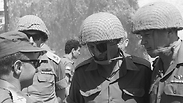
A state living by the sword can't afford to doze off
Op-ed: While Arab armies learned the lessons of the Six-Day War, Israel has been making almost every possible diplomatic and military mistake ever since.
The atmosphere in the State of Israel at the time was that you could not say any other words apart from "we won." And it wasn't just a victory; it was "a victory like no other." The Seven Wonders of the World were nothing at the time compared to this wonder, in which we instantly moved from a depression of the eve of a new holocaust to a remarkable military victory.
In such an atmosphere, it was difficult to impossible to suggest that we draw lessons, check where we went wrong. What lessons could be learned by an army which defeated all the Arab armies around us and parked on the banks of the Suez Canal, on the edge of the Jordan River and at the top of the Syrian hilly region, which was later named the Golan Heights? Why we were the greatest.
Since then – and it began a week or two after that war – we have made and are still making almost every possible mistake, both diplomatically and militarily. We parked on the banks of the Suez Canal in order to make the Egyptians jealous, we allowed settlers to flood the territories all over the place, and we settled in the Golan Heights so that the Syrians wouldn't paddle their legs in the water, God forbid.

In the meantime, we let everyone believe that we are learning lessons, properly drawing conclusions, checking and leaning again, and every soldier who didn't carry the marshal's wand in his backpack felt the changes and improvements from one war to another.
And then came the Yom Kippur War in complete surprise, and taught us that the Egyptians and Syrians had learned the lessons of the Six-Day War and of the War of Attrition very well. They had realized that the Israel Air Force would likely always have an advantage in the battlefields and would be the pillar of fire before the camp. So they flooded the battlefields with missiles and anti-aircraft fire and shot down more than 100 Israeli aircraft.
The truth is that the Air Force was busy during that war with its problems vis-à-vis the Egyptians and the Syrians, and the ground forces' outcry reached the sky, to no avail. The Egyptians also doubled and tripled and quadrupled the number of tank hunters, flooded the desert with anti-tank missiles and made our armored forces' movement very difficult.
In the following wars, they taught us how to skip the victorious Air Force. They activated surface-to-surface missiles against the civilian population, as well as mortar shells, Grade and Qassams of course, and used tunnels to bypass the victorious Israeli army. Senior IDF officers refer to the Arab armies and terror organizations as "learning armies." And what are we?
In an atmosphere of "we won," "a crushing victory" and other similar descriptions, it's very hard to learn and implement important lessons and change combat doctrines. We won, didn't we? So why don’t we repeat those combat doctrines again and again in our next victory? Oops, here's a mistake we can't make, not now and not ever. A state living by the sword cannot afford to doze off.










